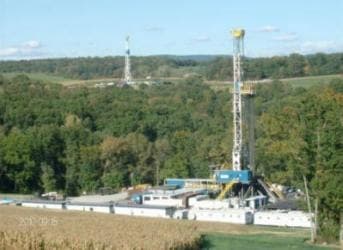Ohio's governor, during his recent State of the State address, said major energy companies working in the state have certain responsibilities to Ohio. The Midwest state hosts vast natural gas reserves in its Utica shale deposit and energy company's like Houston-based Chesapeake are eager to get at those resources. The governor said all the proverbial ducks needs to be in a row in order to tap into those shale reserves but, in a rare display of U.S. political pragmatism, stressed that fear shouldn't get in the way of energy potential.
Ohio estimates its portion of the Utica shale play holds as much as 5.5 billion barrels of oil and 15.7 trillion cubic feet of natural gas. That's substantial. So much so that Chesapeake's chief executive Aubrey McLendon nearly made Jim Cramer, host of CNBC's fiery stock show Mad Money, drool when he spoke of the $10 billion in investments per year for Ohio in the Utica shale play.
McLendon said Utica was "one of our biggest discoveries in U.S. history." But that means more drilling, more fracking and of course, more environmental concerns. Last year, fracking in Ohio triggered a series of small earthquakes. That's certainly no good. And environmental groups are quick to complain about the potential for those mysterious fracking chemicals to somehow wind up in drinking water. The Ohio Environmental Protection Agency, however, said contamination of drinking water is "unlikely" noting "thousands" of production wells were drilled in the state without issue. But never mind that. That sort of crazy logic isn't doing much to rally the environmental base, now is it?
Chesapeake said, according to Akron's Beacon Journal, that it could recycle wastewater from its drilling operations at a rate of about 12,000 gallons per hour. That means Chesapeake might need less fresh water to frack Utica shell and, consequently, produce less liquid waste. The company would still use nasty ol' antifreeze and needs something like 4 million gallons of fresh water per well, but hey, it's a start.
Ohio Gov. John Kasich, during his 2012 State of the State address, warned big energy that his state has to take care that the industry isn't "going to contribute to contamination of the groundwater." The state EPA adds that Ohio is likely to see a "significant increase" in drilling activity in the Utica shale deposit and tighter regulations are needed. Kasich stressed that his administration would do whatever it takes to allay the concerns about the shale industry in Ohio. But, for a state that was once part of the industrial backbone of the U.S. economy, he noted that "we cannot let our fears outweigh the potential." Sound advice, no matter what's at stake.
By. Daniel J. Graeber of Oilprice.com



















His position was that the oil shale that I thought was so plentiful and useful at the time would not be exploited because of the shortage of water. There are a lot of questions about shale gas (and oil) that need to be answered at the present time, when lies about energy resources are flying thick and fast, and this business with water should not be forgotten.
Good article, except the part about fracking causing the earthquakes, These were unintentionally caused by the injecting of fluids into waste disposal wells at excessive pressures not by fracking of wells in anticipation of production.